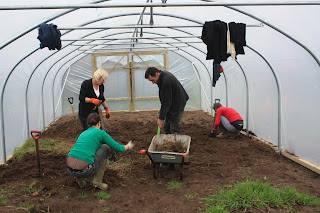Dear Supporters of BCF and Followers of Hugh's blog...
Its been another busy couple of months at BCF with lots happening and lots in the pipeline!
Since the last update we have hosted a couple of extremely lively events at the farm one for a group of fifty teenagers on a world tour- sailing on a training tallship, aptly named the 'class afloat'. They loved the farm, the project and the group of St Just schoolchildren who showed them around 'their' farm so enthusiastically and with such pride. BCF also hosted a celebrationary event for the Federation of City Farms and Community Gardens, who invited trainees from their gardening courses to come and take part in some free workshops (put on by BCF staff and volunteers) and enjoyed a great lunch (produce from the farm- prepared and baked using the Age Concern kitchen- Thanks Sylvia and Jill!)
For the local families we held a pre Feast- feast! a Halloween 'Hextravaganza' at St Just Rugby Club with lots of fiendish games and craft sessions and hog-roasted our community- pig!! (thanks to Tom MacFadden for doing such a grand job both cooking and carving...'twas enjoyed by all).
Also, thanks to the enthusiasm of one of our newest volunteers- Jenny, our produce is not only to be seen at the Pendeen Farmers Market but more recently at the St Just Primary School, where Mrs O Brien has kindly agreed for us to share a stall with them selling farm produce and also any that the school has grown (or parents) for their own funds- a great partnership! Dates for which will be advertised and in the new year we plan for it to be a regular fortnightly event.
On a more practical level....the turkeys are doing what turkeys do best.....getting fat! the chickens are about to be moved to their new site...on the other side of the field! and the pigs....sadly... are gone, sadly because they are a great animal to have around and gone because we've eaten them....which is the reality of being an omnivore.. but what a great life our meat had and we plan to have more...in fact anyone interested in a future share should let us know. To all herbivores and their keepers, all our hay is now sold so until next summer thats it. Further news from the fields is that the cattle that have been so beautifully managing our outer fields through a local third party farmer are about to leave for the winter months.
Great news also on the veg growing front as the farm crew have recently erected our new polytunnel, funding for which was raised from a Cornwall Neighbourhoods 4 Change 'pot' along with match funding from BCF business and in-kind labour...so a huge thanks to all our volunteers for their efforts, which were literally doubled in value!! as well as CN4C for the cash donation.
As far as planning for the future we have now submitted our final application for a lottery bid that, if successful, will make the dream of owning our community farm a reality....though as a plan B is always a good idea- the BCF finance team is already working on a share issue and mortgages and lending schemes appropriate to a community project.
We would also like to announce and welcome a new member to the team, Jackie Packer, who has kindly offered to help with our bookkeeping and banking (phew!), its a great relief to have someone with such experience(and patience) to guide us and keep us in check.
Im sure there are lots of things we have missed, but you can always come and visit and see for yourself how your community farm is progressing, to buy some eggs or volunteer yourself, hours are still 1-5pm on a Tuesday and Saturday and 10-3pm on a Thursday.
Finally the fun-d raising team have been working hard on the winter celebration at the farm and the date for your diary is 22nd December between 3 and 6pm as usual there will be a number of great activities for all the family, some festive food and a chance to gather together for some seasonal sing-song round the christmas tree...so look out for postersin St Just nearer the day and bring your friends and family. We are also inviting the members from Age Concern at around 5pm for a few carols and mince pies in the warmth of the farm kitchen...so if your gran or grandad would like to come along for that then please bring them along.
Once again many thanks to all who have helped and supported us throughout the year and we would like to wish you all a very Merry Christmas, Winter Solstice and a Happy New Year.
written by deb pepper on behalf of the bosavern farm community.

















































